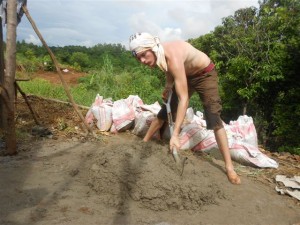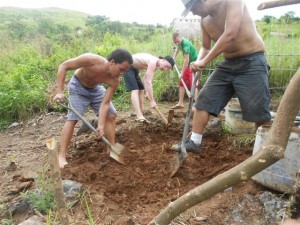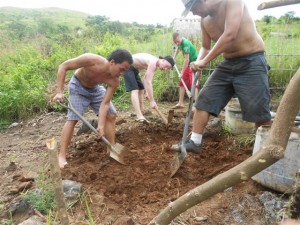by Felix Broeckling
Wed – Fri, sep 11th -13th Community Immersion at PAPAHT
expectations: I expected to go there to build houses and experience living on the same standards of comfort as the aeta. I did not have any fixed expectations besides that, only to make experiences and accept and enjoy what will happen.
 Arriving on Wednesday noon, we carried our materials and food uphills, the first glance of the following days’ physical work waiting for us. Luckily, the community tricycle could be used to carry the water and the ice box for cooling the perishable food. We made ourselves comfortable in the community’s multi-purpose building. Already with the arrangement of the beds and mosquito-nets, two aeta women helped us, only the first expression of the uncomplicated and throughout going hospitality we visitors were treated with.
Arriving on Wednesday noon, we carried our materials and food uphills, the first glance of the following days’ physical work waiting for us. Luckily, the community tricycle could be used to carry the water and the ice box for cooling the perishable food. We made ourselves comfortable in the community’s multi-purpose building. Already with the arrangement of the beds and mosquito-nets, two aeta women helped us, only the first expression of the uncomplicated and throughout going hospitality we visitors were treated with.
Then, we had a meeting with two members of the community-council, to whom we could pose questions concerning their lives, community structure, position and reputation in the society and so on.
By now, they have gained the official right to their ancestral land, which belongs to the community as a whole and is distributed to the families for farming. However, it is not personal property, for example, no family can sell their land, they only are allowed to use it. Politically and legally, there is a very direct and imminent form of democracy. They elect their council and its chairman and vice-chairman by forming a line behind the candidates for whom they want to vote. The officials stay in direct touch with the community and are to solve its problems and represent it. Crime and misbehavior do rarely occur and are being addressed with counseling rather than punishment. So would be massive and community damaging alcohol usage, if it were to take place. Within state-politics, the Aeta are often denied or delayed their demands, they are not at all a priority to the officials and have to continuously advocate and fight for their rights. There is discrimination in everyday-life as well. Denial of medical treatment in favor of richer and non-indigenous Filipinos, comments like “Aeta, Aeta, you belong in the mountains, what are you doing in our city.” They have a hard stand in society and expressed their happiness about reverse experiences, our interest in them for example. And the assistance we were there for.
There is a housing project at PAPAHT, constructing solid houses that withstand typhoons. The materials are provided by The residents build their houses themselves and we were there to provide some more labor craft. I personally had no construction experience before, but we had an introduction and were assigned different supportive tasks like carrying hollow blocks, mixing cement and digging off the soil for the ground floor basis.
It was an interesting and open-minding experience to do some actual physical work and seeing the progress achieved by one’s own hands in cooperation with others. Two houses were constructed during our stay, which made good progress over the three days. We did a tree-planting activity as well. Mostly Mahagony seedlings were put near the new mountain traversing road. In a few years they will contribute to the community’s income.
Besides working, we explored the surrounding nature. Mountains and waterfalls, a beautiful view and growing coconut and banana trees everywhere. Hiking uphill and taking a bath after getting all muddy during construction work was a nice and pleasant recreational activity. Having no electricity connection up there due to lacking government interest to provide it, sunset was the actual end of the active part of the day. My biorhythm corresponded to it and I got really tired at 7pm instead of 10pm or so. There was also an overwhelming silence instead of the omnipresent noise of the city, really relaxing.
On the last day, we had a solidarity service with the community. One guy and in some cases one woman as well presented traditional dances, wearing traditional cloths. They were mostly inspired by animal movement and behavior, as nature has traditionally and in another way today as well, a big importance for the Aeta culture. One of the council members along with his daughter presented a recent Filipino song, “Pusong Bato” on guitar and voice. Then it was our turn, I presented a German song and all of us volunteers sang a church song as well with guitar backing. We then invited the whole community for a meal we had prepared with kind help by some community women.
On the way back downhill, a carabao carriage was provided to transport our materials back. We could ride on it as well, a very cool experience and a beautiful very strong creature.

